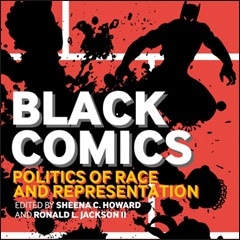5. Afrofuturism: The World of Black Sci-Fi and Fantasy Culture by Ytasha Womack (2013) introduces readers to the burgeoning community of artists creating Afrofuturist works, the innovators from the past, and the wide range of subjects they explore. From the sci-fi literature of Samuel Delany, Octavia Butler and N. K. Jemisin to the musical cosmos of Sun Ra, George Clinton and the Black Eyed Peas’ will.i.am, to the visual and multimedia artists inspired by African Dogon myths and Egyptian deities, the book’s topics range from the “alien” experience of Blacks in America to the “wake up” cry that peppers sci-fi literature, sermons and activism. With a twofold aim to entertain and enlighten, Afrofuturists strive to break down racial, ethnic and social limitations to empower and free individuals to be themselves.
6. Visions of the Third Millennium by Sandra Grayson (2002) analyzes how writers of African descent use the codes of science fiction to explore race and gender, myth and language, slavery and freedom, alienation and difference. Focusing on established and relatively new writers such as Octavia E. Butler, Samuel R. Delany, Steven Barnes and Nalo Hopkinson, Grayson’s groundbreaking study is concerned with how Black science fiction writers interweave the memories of enslaved Africans in their works, revealing journeys in time through Africa that are both metaphorical and literal in their span of physical space, traditional beliefs and African history. By simultaneously looking back and forward in their novels, the writers reflect a construction of time as a pendulum moving in patterns of recurrence that represent inseparability among the past, present and future.
7. Super Black: American Pop Culture and Black Superheroes by Adilifu Nama (2011) places the appearance of Black superheroes alongside broad and sweeping cultural trends in American politics and pop culture, which reveals how Black superheroes are not disposable pop products, but rather a fascinating racial phenomenon through which futuristic expressions and fantastic visions of Black racial identity and symbolic political meaning are presented. Super Black explores how Black superheroes are a powerful source of racial meaning, narrative and imagination in American society that express myriad racial assumptions, political perspectives and fantastic (re)imaginings of Black identity. The book also demonstrates how these figures overtly represent or implicitly signify social discourse and accepted wisdom concerning notions of racial reciprocity, equality, forgiveness and, ultimately, racial justice.
8. The Black Imagination: Science Fiction, Futurism and the Speculative by Sandra Jackson (2011) is a critical collection covering a broad spectrum of works, both literary and cinematic, and issues from writers, directors and artists who claim the science fiction, speculative fiction and Afro-futurist genres.
Rasheedah Phillips is a Philadelphia public interest attorney, speculative fiction writer, the creator of The AfroFuturist Affair, and a founding member of Metropolarity.net. She recently independently published her first speculative fiction collection, “Recurrence Plot (and Other Time Travel Tales).”


